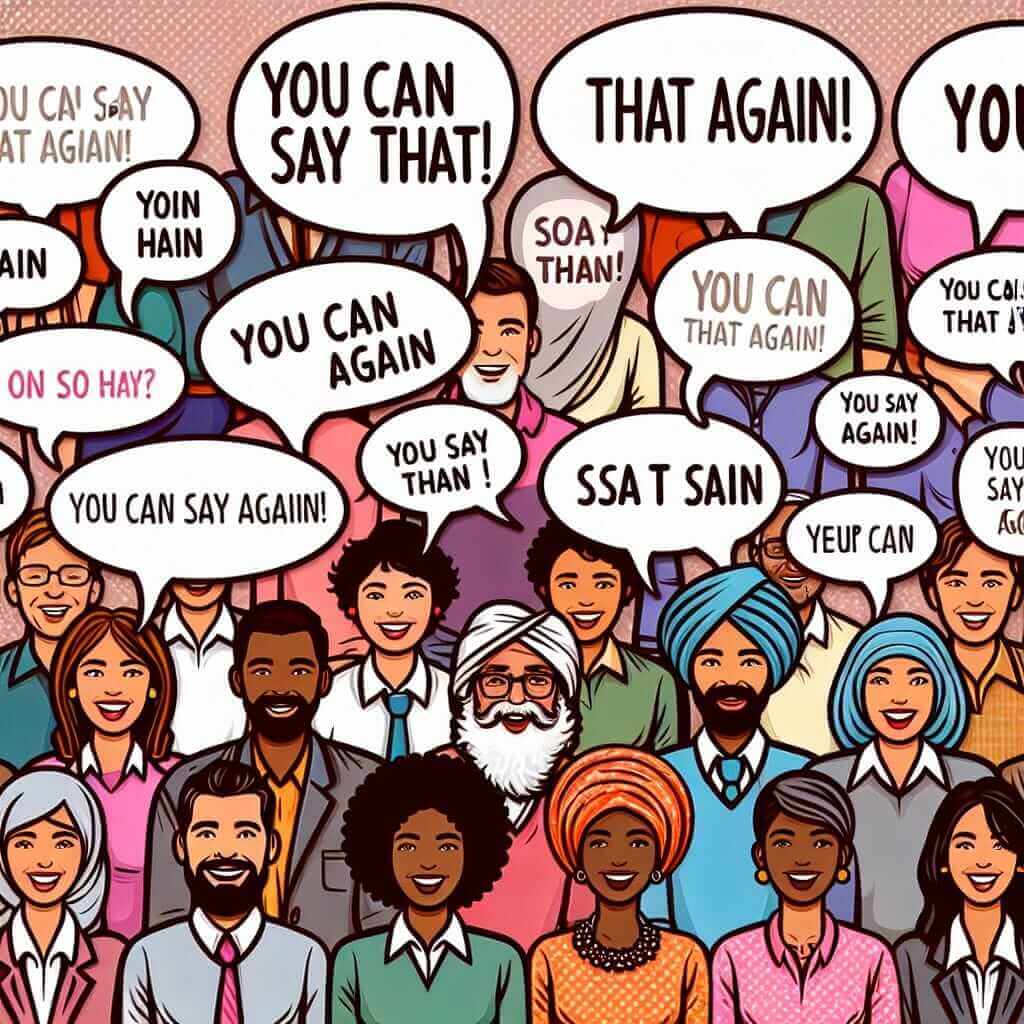The phrase “You can say that again” is an idiom frequently encountered in everyday English, making it a valuable item for IELTS examinees to master. Understanding and using this idiom correctly can provide a significant boost to your speaking and writing test scores.
Synonyms and Antonyms
- Indeed /ɪnˈdiːd/ – adverb – used to emphasize a statement or response confirming something already mentioned:
- “Indeed, it was a memorable experience.”
- Absolutely /ˌæb.səˈluːt.li/ – adverb – used to emphasize that something is completely true:
- “Absolutely, I agree with your point.”
- Precisely /prɪˈsaɪs.li/ – adverb – emphasizing accuracy:
- “Precisely, that’s exactly what I meant.”
- Definitely /ˈdef.ɪ.nət.li/ – adverb – without doubt:
- “The homework was definitely difficult.”
- Exactly /ɪɡˈzækt.li/ – adverb – in a precise or correct manner:
- “Exactly, that is the reason I am late.”
Understanding the Idiom
Meaning and Pronunciation
“You can say that again” /juː kæn seɪ ðæt əˈɡɛn/ is an idiom used to express strong agreement with what someone has just said. It emphasizes that you feel the same way or have experienced something similar.
Usage Variations
The idiom doesn’t have varied meanings; it is straightforward and used in informal communication.
Usage in IELTS
Frequency and Importance
While idioms like “You can say that again” may not frequently appear in the IELTS Reading or Listening sections, they are incredibly useful in the Speaking and Writing sections. Using idiomatic expressions accurately can demonstrate a high level of English proficiency and help you score higher in criteria such as Lexical Resource and Fluency.
Sample IELTS Questions
-
Speaking Part 1:
- Examiner: “Do you think learning English is challenging?”
- Answer: “You can say that again! It takes a lot of effort and practice.”
-
Speaking Part 2:
- Describe a difficult task you accomplished. Include the phrase in your description to emphasize your feelings about the difficulty.
-
Writing Task 2:
- Topic: “Discuss both views whether technology makes life easier or more complicated.”
- Example sentence: “Modern life is unquestionably easier thanks to technology. You can say that again, considering the convenience it brings.”
Combined with Other Expressions
- “As a matter of fact,” – similar emphasis on agreement:
- “It was exhausting, as a matter of fact. You can say that again!”
- “No doubt about it,” – similar in meaning to express certainty:
- “No doubt about it, the concert was spectacular. You can say that again.”
- “Without a doubt,” – emphasizing agreement strongly:
- “Without a doubt, this term was tough. You can say that again.”
Example Sentences
- “John remarked that the weather was unbearably hot. Mary responded, ‘You can say that again!'”
- “After finishing the marathon, he said, ‘That was the toughest race of my life.’ His friend echoed, ‘You can say that again.'”
- “When the teacher mentioned the difficult exam, the students murmured, ‘You can say that again.'”
- “During the meeting, someone muttered, ‘This project is a nightmare.’ His colleague added, ‘You can say that again.'”
- “She commented, ‘This book is so boring,’ and her sister replied, ‘You can say that again.'”

Idioms and Related Phrases
- “Amen to that” – Used to show strong agreement.
- “It’s been a long week. Amen to that!”
- “You took the words right out of my mouth” – Indicates that someone said exactly what you were thinking.
- “It’s freezing outside! You took the words right out of my mouth.”
- “Spot on” – Exactly right; perfect.
- “Your analysis of the situation is spot on.”
- “Preach it” – Used to encourage enthusiastic agreement.
- “We need more holidays. Preach it!”
- “Couldn’t agree more” – Used to express complete agreement.
- “That policy is ridiculous. I couldn’t agree more.”
Conclusion
Incorporating idioms like “You can say that again” into your IELTS preparation can make a significant difference in your performance, particularly in the Speaking and Writing sections. Remember to use such expressions naturally and contextually to demonstrate your command of English.
Practice using this idiom in various contexts to get more comfortable. For more tips on mastering idiomatic expressions and other advanced vocabulary, consider exploring related articles like IELTS Essay Structures and the Use of “It Turns Out That”.
Happy studying, and remember, every bit of practice counts!